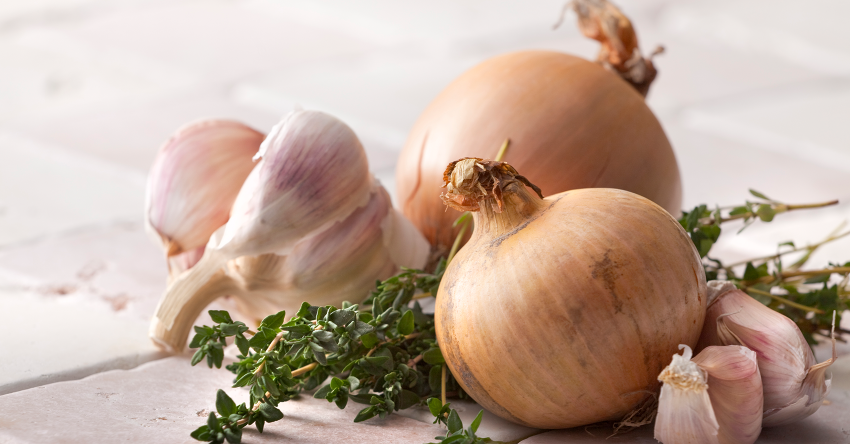
Today I want to talk about issues in your digestive tissues! We all experience tummy issues from time to time. Before I focused on my gut health, the “trains” weren’t exactly running on schedule (if ya catch my drift). Some of us have gotten so used to living with abdominal problems that it’s become a fact of life (along with having too much stress and not enough sleep). Well, it’s time to pump the brakes and get your GI troubles taken care of.
Stress, hormones, exercise and even genetics play a role in the health of your digestive system. But the biggest player is what you eat (or don’t eat!). Your gut is the center of your physical and mental state—it guides your overall well-being. The food you eat travels 30 feet from your mouth to your colon. That’s a long journey and along the way, things can get complicated. So sometimes, your digestive system could use an extra boost to get back into balance.
Your gut needs lots of things for smooth digestion, including three biggies I want to talk about today: digestive enzymes, probiotics and the prebiotics that feed them. Digestive enzymes help break down food, probiotics (bacteria) help keep our systems in balance and prebiotics act as a fertilizer to help grow the good bacteria that are already there.
But sometimes when we make improvements to our diets, our bodies respond in curious ways. Like when you begin eating more plant-based foods, your digestive system might get a little funky at first. From bloating to cramps, an increase in veggies can be an adjustment for our systems.
That’s why adding in enzymes, probiotics and prebiotic foods can be extremely helpful when you’re transitioning to a diet higher in fiber and plants—like my 21-day total wellness program, Crazy Sexy You. These babies will help you reduce your discomfort so you can keep on truckin’ to glorious health!
Here’s more good news: Your overall health will vastly improve when you get your digestive system in good shape. Even if you think your gut is pretty hearty and you don’t need to supplement, you can still benefit from adding some enzymes, probiotics and prebiotics into your meals.
Here are the top benefits:
- You absorb more nutrients (delish!)
- Your digestive issues go bye-bye
- You’re less likely to get infections
- Your body gets a cleansing tune-up
- Your gal parts get a boost and you’re less likely to experience UTI’s (Amen to that!)
That’s a whole lotta goodies right there! So let’s explore the world of gut-boosters. You’ll learn what they do and how they’ll help you. Then we’ll go over some everyday food and supplement options you can start exploring right away. As always, check with your doc before adding supplements to your life. Let’s jump in!
How can you boost your gut health?
Soak up more nutrition from your food with digestive enzymes
Digestive enzymes are produced in your salivary glands and pancreas, but you can take them as a supplement. Their job is to break your food down into smaller compounds that your body can use. So when you boost the amount of digestive enzymes in your gut through supplementation, you’ll probably experience improved digestion and get more nutrition from your food. Sounds like a win-win to me!
Many people have had digestive discomfort their whole lives, but did you know that production of enzymes starts to decrease with age? Whatever the case may be, if you’re experiencing gas, bloating, health issues associated with your pancreas, leaky gut or vitamin and mineral deficiencies, then digestive enzymes could bring relief.
To get started, most people take digestive enzymes at every meal. Within a month or two, however, you should be able to take just one per day. My favorite brands include the Digestive Enzymes Ultra from Pure Encapsulations (here), the Digest Spectrum from Enzymedica (here) and chewable Garden of Life’s Organic Digest+ (here). You’ll know they’re working when your digestive symptoms decrease or even go away. You can wean off them at any time and add them back into your diet as needed.
Remedy digestive and women’s health issues with probiotics
Probiotics help improve the balance of healthy bacteria in your GI tract, keeping it clean and healthy. They’re great for helping with digestion, immune function, weight loss, absorbing nutrients (just like enzymes), detoxing your body, keeping healthy bacteria in girly parts, preventing UTI’s and promoting a happy mood. I bet you’re wondering: Where can I get some of that?
Fermented foods, like organic tempeh, organic miso, sauerkraut, kimchi, coconut kefir and kombucha, are excellent sources of probiotics. But even if you’re regularly getting these foods in your diet, you can still add a supplement for an extra probiotic boost. Just be sure to find one with “enteric coating”, which helps your body absorb all that probiotic goodness. I like Dr. Ohhira’s (here), Garden of Life’s Primal Defense Probiotics (here), and Jarro-Dophilus EPS (here) because they’re good for travel and don’t need to be refrigerated. And most docs will say you can’t overdo it when it comes to probiotics.
Pump up your gut with prebiotic foods
I know things can get confusing between enzymes and probiotics, but hang in there with me. If you really want to kick things up a notch, you can also add in prebiotic foods that contain a type of fiber that feeds and fuels probiotics. Basically, they enhance your gut-healing and immune-boosting power. And if they’re raw and uncooked, even better. The more prebiotic food, the healthier your digestive tract will be.
Here are the 10 best prebiotic foods to add to your diet:
- Raw chicory root
- Raw Jerusalem artichoke
- Raw dandelion greens
- Raw garlic
- Raw onion
- Cooked onions
- Raw asparagus
- Raw wheat bran
- Baked wheat flour
- Raw banana
The recommended intake of prebiotic fiber is 5 grams a day, which is also the amount in 1 banana plus a piece of high-fiber bread.

